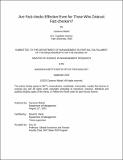Are Fact-checks Effective Even for Those Who Distrust Fact-checkers?
Author(s)
Martel, Cameron
DownloadThesis PDF (2.188Mb)
Advisor
Rand, David G.
Terms of use
Metadata
Show full item recordAbstract
There is growing concern over the spread of misinformation. One of the most widely adopted interventions by online platforms for addressing false stories is applying fact-checker informed ‘warning labels’ over misleading posts. Despite a rich literature on corrections and approaches for debunking misinformation, there is comparatively less work examining evidence on the effectiveness of warning labels. Do warning labels effectively reduce belief and spread of misinformation? Chapter I reviews research aimed at answering this important question, and further investigates factors contributing to warning label efficacy: features of the labels themselves, features of the underlying labeled content, and features of individuals viewing labeled content. Overall, existing research suggests that warning labels typically produce consistent, beneficial effects – though the size of these effects is moderated by a multitude of relevant factors. We highlight features that best contribute to warning label efficacy and discuss potential limitations and implications of labelling policies for addressing online misinformation.
As reviewed in Chapter I, prior work suggests that warning labels are effective at reducing the belief and spread of false content on average. However, there is concern about growing distrust of fact-checkers, particularly among those on the political right. In Chapter II we investigate whether trust in fact-checkers moderates the efficacy of warning labels. Are warning labels from fact- checkers effective even for those who say they distrust fact-checkers? In a correlational study (N=1,000), we first establish and validate an adapted trust in fact-checkers measure. We also explore the relationship between trust in fact-checkers and partisanship and replicate prior findings of more Republican-favoring participants reporting less trust in fact-checkers. We also extend upon such work by providing evidence that skill-based traits like procedural news knowledge and analytic thinking exacerbate this partisan asymmetry. Next, we conduct meta-analyses across 21 experiments (N=15,983) in which participants evaluated either their perceived accuracy or sharing intentions of news articles. Participants either received no warning labels, or warning labels on a high proportion of false news articles encountered. We find that warning labels were on average effective at reducing belief and sharing of false headlines. Next, we find that trust in fact-checkers moderates warning efficacy on accuracy, but do not find evidence of moderation on sharing intentions. Importantly, despite this moderation, our results suggest that warning labels significantly reduce belief and sharing of false headlines even for those most distrusting of fact- checkers.
Date issued
2023-09Department
Sloan School of ManagementPublisher
Massachusetts Institute of Technology